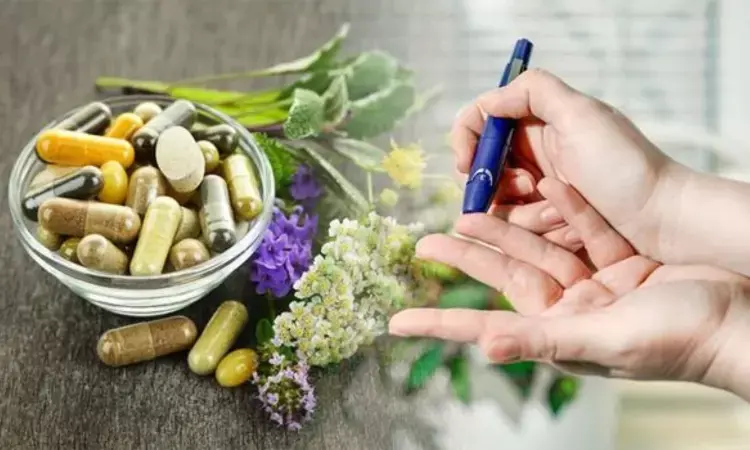- Home
- Medical news & Guidelines
- Anesthesiology
- Cardiology and CTVS
- Critical Care
- Dentistry
- Dermatology
- Diabetes and Endocrinology
- ENT
- Gastroenterology
- Medicine
- Nephrology
- Neurology
- Obstretics-Gynaecology
- Oncology
- Ophthalmology
- Orthopaedics
- Pediatrics-Neonatology
- Psychiatry
- Pulmonology
- Radiology
- Surgery
- Urology
- Laboratory Medicine
- Diet
- Nursing
- Paramedical
- Physiotherapy
- Health news
- Fact Check
- Bone Health Fact Check
- Brain Health Fact Check
- Cancer Related Fact Check
- Child Care Fact Check
- Dental and oral health fact check
- Diabetes and metabolic health fact check
- Diet and Nutrition Fact Check
- Eye and ENT Care Fact Check
- Fitness fact check
- Gut health fact check
- Heart health fact check
- Kidney health fact check
- Medical education fact check
- Men's health fact check
- Respiratory fact check
- Skin and hair care fact check
- Vaccine and Immunization fact check
- Women's health fact check
- AYUSH
- State News
- Andaman and Nicobar Islands
- Andhra Pradesh
- Arunachal Pradesh
- Assam
- Bihar
- Chandigarh
- Chattisgarh
- Dadra and Nagar Haveli
- Daman and Diu
- Delhi
- Goa
- Gujarat
- Haryana
- Himachal Pradesh
- Jammu & Kashmir
- Jharkhand
- Karnataka
- Kerala
- Ladakh
- Lakshadweep
- Madhya Pradesh
- Maharashtra
- Manipur
- Meghalaya
- Mizoram
- Nagaland
- Odisha
- Puducherry
- Punjab
- Rajasthan
- Sikkim
- Tamil Nadu
- Telangana
- Tripura
- Uttar Pradesh
- Uttrakhand
- West Bengal
- Medical Education
- Industry
Herbal decoction lowers blood sugar in diabetes patient without insulin or oral antidiabetic medications: Case report

South Korea: A recent case report described in Medicina has shed light on the hypoglycemic effect of a herbal decoction (Modified Gangsimtang) in a patient with severe type 2 diabetes (T2D) refusing oral anti-diabetic medication.
The study reported hyperglycemia treatment using herbal medicine without oral hypoglycemic agents or insulin therapy.
"Herbal decoctions such as modified Gangsimtang (mGST) can lower hyperglycemia in type 2 diabetes patients who refuse conventional therapy," Sungjun Joo, Kyung Hee University, Dongdaemun-gu, Seoul, Republic of Korea, and colleagues reported.
As some patients refuse to receive conventional therapies, there has been a growing interest in alternative therapies for T2D. In East Asia, herbal medicine is often used for diabetes treatment, and mGST is prescribed to treat a condition called wasting thirst, which resembles type 2 diabetes.
The researchers presented a case of a patient who refused conventional medications and was administered GST with dietary restrictions. The treatment lowered blood glucose levels, resolved hyperglycemic symptoms without insulin injections or oral hypoglycemic agents, and maintained optimal plasma glucose levels during a long-term telephone follow-up period.
The case concerned a 36-year-old man with obesity who was diagnosed with T2DM four years before hospitalization and experienced a reduction in blood glucose level from 22.2–27.8 mmol/L to 5.6–11.1 mmol/L by using herbal medicines. He visited D Korean Medicine Hospital with general weakness and chronic polydipsia as chief complaints.
He was diagnosed with type 2 diabetes based on an HbA1C level of 11.7% and a 2 h postprandial blood glucose level of >25.0 mmol/L (450 mg/dL). Moreover, he was diagnosed with a "dual deficiency of qi and yin” owing to ordinary symptoms. The patient received mGST 120 mL thrice daily during his 30-day inpatient treatment; as a result, there was a reduction in his postprandial blood glucose level from 25.3 mmol/L to 8.6 mmol/L, triglyceride levels decreased from 11.7 mmol/L to 2.0 mmol/L, and polydipsia decreased (visual analogue scale score decreased from six to one).
After the treatment, plasma glucose levels remained stable, and no adverse events were observed over 200 days. Herbal decoction was administered to reduce plasma glucose levels without using insulin or oral hypoglycemic agents.
To sum up, a patient with severe type 2 diabetes, hyperglycemia, and hypertriglyceridemia with hyperglycemic symptoms, such as polyuria and polydipsia, who refused conventional medication was successfully treated with mGST based on TR to reduce plasma glucose levels.
After being given hospital discharge, the patient's plasma glucose remained stable via lifestyle management without herbal medicine for six months, thus indicating that the effect of the mGST treatment lasted for about 6 months; no side effects were observed.
"For type 2 diabetes patients who refuse conventional treatment, mGST can be considered for glycemic control," the researchers concluded.
Reference:
Joo, S., Chun, H., Lee, J., Seo, S., Lee, J., & Leem, J. (2023). Hypoglycemic Effect of an Herbal Decoction (Modified Gangsimtang) in a Patient with Severe Type 2 Diabetes Mellitus Refusing Oral Anti-Diabetic Medication: A Case Report. Medicina, 59(11), 1919. https://doi.org/10.3390/medicina59111919
Dr Kamal Kant Kohli-MBBS, DTCD- a chest specialist with more than 30 years of practice and a flair for writing clinical articles, Dr Kamal Kant Kohli joined Medical Dialogues as a Chief Editor of Medical News. Besides writing articles, as an editor, he proofreads and verifies all the medical content published on Medical Dialogues including those coming from journals, studies,medical conferences,guidelines etc. Email: drkohli@medicaldialogues.in. Contact no. 011-43720751


